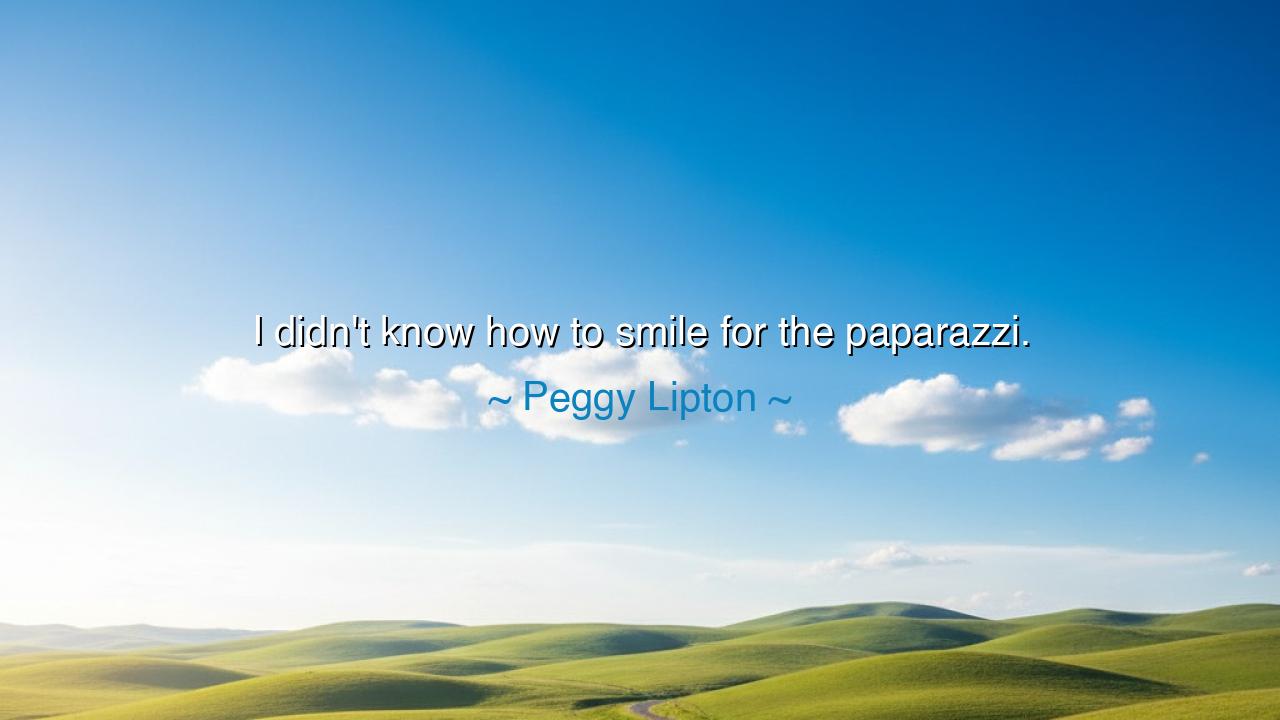
I didn't know how to smile for the paparazzi.






Hear, O seeker of truth, the quiet yet powerful words of Peggy Lipton: “I didn’t know how to smile for the paparazzi.” Though they seem small, they unveil the weight of a great struggle—the conflict between the self as it truly is, and the self as the world demands it to be. In that single line rests the sorrow of many who walk under the glare of cameras: the battle of authenticity against performance, of humanity against spectacle.
The meaning of this confession is clear: Lipton, a woman both celebrated and scrutinized, reveals the discomfort of existing in a world where one’s face is not one’s own, but property of the crowd. The smile, that most human of gestures, becomes unnatural when forced for the lens of the paparazzi. What was once spontaneous and true is transformed into armor, a mask of expectation. To say she did not know how to smile is to admit that she could not reconcile her inner truth with the outer demand for endless performance.
The origin of such wisdom lies in the world of celebrity and fame, but its echoes reach far beyond. The paparazzi—those relentless seekers of images—represent society’s hunger for appearance over essence. Lipton’s inability to pose reflects the spirit’s rebellion against falsehood. For in every age, there are those pressed to present themselves in ways that do not align with their heart. Ancient kings cloaked themselves in symbols of divinity they did not feel; courtiers laughed at jokes they did not find amusing; and artists, too, have hidden their fatigue behind polished expressions.
History offers us vivid parallels. Consider Princess Diana, who lived under the same unrelenting pursuit of photographers. Her every movement was captured, her every smile dissected, until her humanity was often overshadowed by her image. She too confessed to moments when the smile felt like a burden, an act performed not for joy but for survival. Lipton’s words echo this plight, reminding us that fame is not always freedom, but often a prison made of lenses and flashbulbs.
Yet within her confession lies a deeper truth: that one must reclaim the smile for oneself. A smile should not be given to please the masses or satisfy the hunger of strangers—it should rise from the heart, offered freely to those who deserve it. Lipton’s resistance to the false ritual of smiling reveals her courage to remain authentic in a world demanding conformity. She reminds us that sincerity, even if misunderstood, holds greater value than empty performance.
For us, the lesson is practical and profound. In our own lives, though we may not face the paparazzi, we are often called to perform—to wear masks at work, in society, or even among friends. Yet we must guard against the loss of authenticity. Let your smile be true, not rehearsed. Offer it when you feel joy, not when you are compelled. By doing so, you preserve the integrity of your spirit, and you honor the sacred bond between inner self and outward expression.
And so, O listener, let these words guide you: do not surrender your authenticity to the demands of the crowd. When you smile, let it be a reflection of truth, not obligation. When you are weary, do not fear to show it; when you are joyful, let your laughter ring. Peggy Lipton’s gentle confession is not weakness but strength, for in admitting she could not force a smile, she reclaimed her humanity in a world too often blinded by appearances.
Thus, the teaching endures: a genuine smile is worth more than a thousand hollow ones. Protect it, honor it, and let it shine only when your heart commands it. For in this, you walk the path of truth, and truth is the light that outlasts all flashes of the camera.






AAdministratorAdministrator
Welcome, honored guests. Please leave a comment, we will respond soon